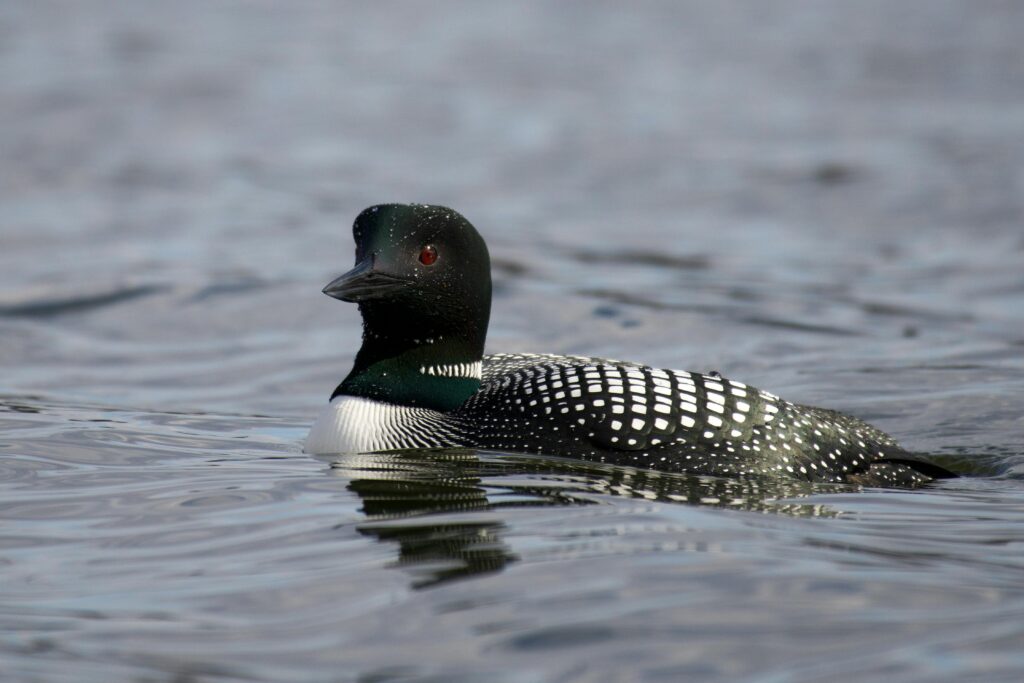
DISTRICT OF LAKELAND NO. 521
Serving Emma, Christopher, Anglin & McPhee Lakes, and a portion of the Boreal Forest Region.Environmental Bylaws and Environmental Plan
Healthy Shorelines
- Lakeshore Erosion
- Love Your Lake: Natural Edge Program
- Vacationland News: Shoring up our Shorelines
- Boat Wakes
- Wetlands
Water Quality
- Water Quality Overview
- Yearly Water Quality Summaries
- You and Lake Water Quality
- FAQ’s
- Tips for Healthy Lakes and Recreation
Wildlife/Invasive Species
Fires in Lakeland
General Information & Resources
About the Committee/Contact Us
Loons in Lakeland
Photo Credit: Karee Davidson 
Loons and Leisure Craft
Written by Jacquie Moore
Signs are posted around the Lakeland lakes reminding boaters and jet skiers
to “Control Your Wake”. But why? If there aren’t kayaks, canoes or swimmers
nearby, what’s the problem? There is a deeper, systemic problem with boat
wakes. Boat wakes erode the shorelines, which muddies and clogs up the
lake waters. They destroy the living lake ecosystem; the fish spawning habitat
and the nesting loons.
Loons are a territorial bird; they return to the same lake each year to breed.
According to the Canadian Lakes Loon Survey, there has been a decline
in chick production over the years. However, not in the Lakeland – not yet
anyway. In fact, Anglin Lake has the highest population of loons per acre feet
of lake in western Canada. Al Christensen, former reeve of the Lakeland, has
been one of the volunteers counting loons at Anglin Lake for some 12 years
now. Asked why he cares about these birds, Al laughs: “Well, anybody that
lives at Anglin Lake is in love with loons! We have so many of them and the
call is so haunting that you can’t help but enjoy it.”
“We count the loons three times in the summer,” explains Al. “In mid-June,
mid-July, and mid-August. In the June count we found three viable nests that
had eggs in them. You stay well back so you don’t disturb the bird on the
nest. The male and the female take turns so that someone is on the nest at
all times.” Al says the numbers vary each year, but in general Anglin Lake is
home to some 100 permanent resident loons.
“Because loons don’t walk,” says Al, “they build the nest within a foot or so
of the edge of the water. So if the water comes up two inches within a short
period of time, you’ve drowned the nest out. Boat wakes, the wash, will drown
out a nest.”
“Quite frankly,” Al adds, “a little fishing boat with a 15-horse motor on it, if the
boater isn’t paying attention, can do almost as much damage to the birds as
a wake boat. My mantra the whole time I was in public service is that if we
operate as a bunch of good people, which we all are, there is enough room
for all activities up here. You’ve just got to be mindful that your activity isn’t
screwing somebody else up.”
If the Golden Rule isn’t enough to motivate respectful boating practices, there
is a federal rule. Transport Canada states that the province of Saskatchewan,
among others, has a speed limit of 10 km/hour within 30 metres of any
shoreline – whether it is posted or not.
To report speeding vessels, please call the RCMP.
From: Vacationland News EAC Articles